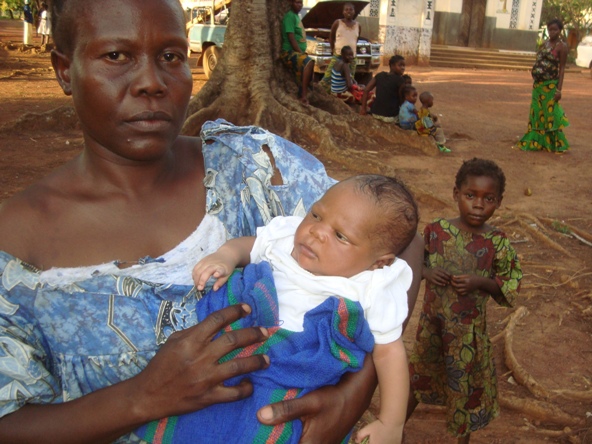
Woman and child displaced by fighting in Central Africa Republic. They now receive aid from the church. Credit : Caritas
Pictures are said to speak a thousand words, but sometimes a paragraph works just as well. This is the picture that Bishop Juan José Aguirre of Bangassou recently painted of the Central African Republic in an email to Cordaid (Caritas Netherlands).
“Roads are closed and officials cannot get to their places of work. People in Bangui are isolated and institutions in the rest of the country remain unmanned,” wrote Bishop Bangassou towards the end of April.
”Salaries are no longer being paid, families have become even poorer, people have less to eat, and school contributions can no longer be paid. Gasoline supplies have also dried up. This means that traffic will come to a standstill and generators will no longer work. As a knock-on effect there will be no electricity to charge mobile phones, no power to operate oxygen and other equipment in hospitals. There will also be no transport for medication, so no ARVs (anti-retrovirals) for AIDS patients and no medication for patients in a terminal phase. And in all municipal town halls birth certificates have been systematically destroyed.”
Since the Seleka rebels seized power in the Central African Republic the country has spiralled downwards into chaos and lawlessness. The capital, Bangui, fell on 24 March and since then the international community has called for a stronger peacekeeping force.
People have been seeking refuge where they can. This week the United Nations refugee agency urged countries to refrain from repatriating refugees to CAR, amid worsening violence and human rights abuses.
Working in CAR has been a risky business for Caritas ever since armed groups started to advance from the north last year.
The violence and looting makes delivering aid extremely difficult and also dangerous. This leaves communities cut off and without help. But two weeks ago Caritas went to offer support to the injured and distressed in Bangui, taking them food which included rice, sardines, milk and beans.
The mission was led by Archbishop Dieudonné Nzapalainga of Bangui and he was accompanied by the secretary general of Caritas CAR, Abby Elysée Guédjandé, and the head of Caritas Bangui, Sr. Flora Guerekopialo. Those who received help sang hymns in thanks and but also to keep their spirits up.
But other Caritas member organisations have had to stop programmes and/or evacuate staff when the situation has been too unstable.
“There were moments throughout the day when we were not sure we would survive,” said Maribeth Black, a Catholic Relief Services (a US member of Caritas) staff member of her last day in Bangui. “Grenades and bullets were whizzing by outside the gate and angry looters were banging.”
Around the same time, Cordaid colleagues had to be evacuated from Bangui too as there were fears for their safety.
Speaking from Cameroon, to where she and other CRS staff were evacuated, Maribeth said, “All petrol stations (in Bangui) have been destroyed. All main stores looted. Vehicles have been stolen. The local economy has certainly taken a huge hit and it will be weeks, perhaps even months, until it functions again as normal.”
Reports coming out of Bangui paint a brutal picture of fear and violence with no end in sight. No one feels safe and help and comfort are hard to come by as the violence persists.
“It will be difficult to get this country back on its feet,” says Bishop Bangassou, “Everything has been destroyed and nearly everyone has been robbed.”
